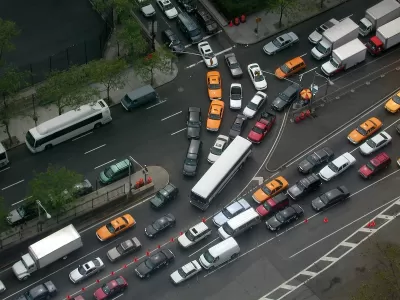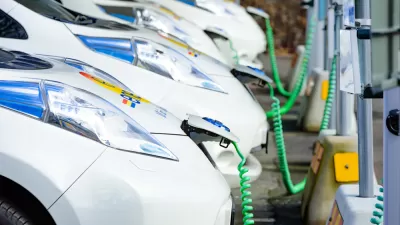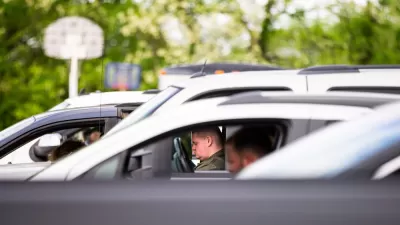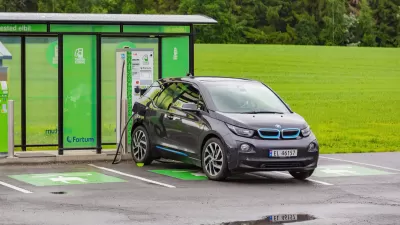Encouraging Americans to drive less — and supporting cities where it’s possible to do so — could save the country trillions more than just electrifying the transportation sector.

A new study finds that reducing private car ownership and miles driven in the United States could save a collective $6.2 trillion more than just focusing on shifting to electric vehicles.
As Kea Wilson explains in Streetsblog USA, the report from the Union of Concerned Scientists “states that giving Americans the freedom to choose among multiple modes of travel is "key to the climate transition" — and that making ‘visionary but feasible’ changes, like shifting land use patterns and investing in walking, biking, and transit, could get our country to the critical net zero milestone.”
According to the report, reducing vehicle miles traveled by roughly 27 percent by 2050 could eliminate the need for $201 billion in new infrastructure and save the nation $128 billion in public health costs. “And then there's the staggering costs of car crash deaths themselves, 250,000 of which could be avoided if VMT was cut, along with 3.7 million crash injuries that often cost far more than a fatality.”
Americans would also save almost $6 trillion on car payments, fuel, insurance, and other costs associated with vehicle ownership.
Kevin Shen, the lead author of the report, highlights the need for options, saying, “if you look into the more recent research [about] what actually benefits people in the U.S., it is not automobility. Providing a multitude of options — that's what actually benefits people.”
FULL STORY: Report: Confronting Car Dependence Won’t Just Help With Climate Change; It’s a $6.2 Trillion Opportunity

Alabama: Trump Terminates Settlements for Black Communities Harmed By Raw Sewage
Trump deemed the landmark civil rights agreement “illegal DEI and environmental justice policy.”

Planetizen Federal Action Tracker
A weekly monitor of how Trump’s orders and actions are impacting planners and planning in America.

Why Should We Subsidize Public Transportation?
Many public transit agencies face financial stress due to rising costs, declining fare revenue, and declining subsidies. Transit advocates must provide a strong business case for increasing public transit funding.

Understanding Road Diets
An explainer from Momentum highlights the advantages of reducing vehicle lanes in favor of more bike, transit, and pedestrian infrastructure.

New California Law Regulates Warehouse Pollution
A new law tightens building and emissions regulations for large distribution warehouses to mitigate air pollution and traffic in surrounding communities.

Phoenix Announces Opening Date for Light Rail Extension
The South Central extension will connect South Phoenix to downtown and other major hubs starting on June 7.
Urban Design for Planners 1: Software Tools
This six-course series explores essential urban design concepts using open source software and equips planners with the tools they need to participate fully in the urban design process.
Planning for Universal Design
Learn the tools for implementing Universal Design in planning regulations.
Caltrans
Smith Gee Studio
Institute for Housing and Urban Development Studies (IHS)
City of Grandview
Harvard GSD Executive Education
Toledo-Lucas County Plan Commissions
Salt Lake City
NYU Wagner Graduate School of Public Service





























